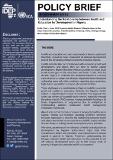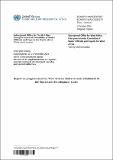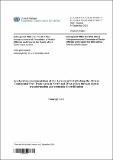Our Institutional Repository is currently undergoing an upgrade. The platform remains accessible for search and consultation. However, user login and content submissions are temporarily disabled. We appreciate your understanding.
African Perspectives of a Just Transition to low-carbon economies : summary for policy makers
| dc.description.abstract | The African continent is a region with the greatest development challenges in the world. The challenges African countries face in pursuit of their development objectives has a historical and structural context. According to the Independent Expert Group on Just Transition and Development, African economies suffer at least three structural deficiencies, a lack of food sovereignty; a lack of energy sovereignty; and low value-added content of exports relative to imports. These deficiencies in turn contribute to structural trade deficits, weakened African currencies and pressure to issue debt denominated in foreign currencies, resulting in indebtedness which limits options for climate action. These structural challenges extend to the global economic trade and financial architecture that translates to excessively high costs to access climate and development finance compared with other emerging economies and developed countries. The global trade regime further places African countries in commodity dependence, and provision of goods at the lowest end of value addition in the global value chains, leading to volatile financial flows. The sustainable development context for Africa suggests that the transitions to low-emission, and climate-resilient development, finance flows consistent with 1.5o C, should contribute to the reduction of structural, socio-economic, and technological inequalities between developed and developing countries as the present-day structural inequalities cannot deliver a ‘just transition’. | en |
| dc.title | African Perspectives of a Just Transition to low-carbon economies : summary for policy makers | en |
| uneca.subject.fulltaxonomy | UNBIS::ECONOMIC DEVELOPMENT AND DEVELOPMENT FINANCE::DEVELOPMENT FINANCE | en |
| uneca.subject.fulltaxonomy | UNBIS::NATURAL RESOURCES AND THE ENVIRONMENT::ENVIRONMENT::ENVIRONMENTAL ECONOMICS | en |
| uneca.subject.fulltaxonomy | UNBIS::NATURAL RESOURCES AND THE ENVIRONMENT::ENERGY RESOURCES::ENERGY CONVERSION | en |
| uneca.subject.fulltaxonomy | UNBIS::NATURAL RESOURCES AND THE ENVIRONMENT::ENERGY RESOURCES::ENERGY RESOURCES DEVELOPMENT | en |
| uneca.subject.fulltaxonomy | UNBIS::GEOGRAPHICAL DESCRIPTORS::AFRICA | en |
| uneca.subject.fulltaxonomy | UNBIS::GEOGRAPHICAL DESCRIPTORS::AFRICA | en |
| uneca.subject.fulltaxonomy | UNBIS::NATURAL RESOURCES AND THE ENVIRONMENT::ENERGY RESOURCES::ENERGY CONSUMPTION | en |
| uneca.creatorCorporate.fulltaxonomy | Corporate Authors::United Nations. Economic Commission for Africa | en |
| ags.creatorCorporate | United Nations. Economic Commission for Africa | en |
| ags.subjectThesaurus | DEVELOPMENT FINANCE | en |
| ags.subjectThesaurus | ENVIRONMENTAL ECONOMICS | en |
| ags.subjectThesaurus | ENERGY CONVERSION | en |
| ags.subjectThesaurus | ENERGY RESOURCES DEVELOPMENT | en |
| ags.subjectThesaurus | AFRICA | en |
| ags.subjectThesaurus | AFRICA | en |
| ags.subjectThesaurus | ENERGY CONSUMPTION | en |
| ags.descriptionNotes | Includes References | en |
| ags.publisherPlace | Addis Ababa: | en |
| ags.publisherName | UN. ECA, | en |
| dc.date.accessioned | 2024-10-22T16:44:24Z | |
| dc.date.available | 2024-10-22T16:44:24Z | |
| dc.date.issued | 2024-07 | |
| dc.identifier.uri | https://hdl.handle.net/10855/50235 | |
| dc.format.extent | 90 p. :ill. | |
| dc.language | eng | |
| dc.type | Policy paper | |
| uneca.workflow.processed | true | |
| ags.creatorCorporate | United Nations. Economic Commission for Africa | |
| ags.subjectThesaurus | DEVELOPMENT FINANCE | |
| ags.subjectThesaurus | ENVIRONMENTAL ECONOMICS | |
| ags.subjectThesaurus | ENERGY CONVERSION | |
| ags.subjectThesaurus | ENERGY RESOURCES DEVELOPMENT | |
| ags.subjectThesaurus | AFRICA | |
| ags.subjectThesaurus | ENERGY CONSUMPTION | |
| ags.subjectClassification | 02.02.00 ECONOMIC CONDITIONS | |
| ags.subjectClassification | 03.10.00 ENERGY RESOURCES | |
| ags.availabilityLocation | ECA-HQ | |
| ags.rights.termsofuse | public | |
| ags.JN | b134567 | |
| uneca.language.supported | en |
Files in this item
This item appears in the following Collection(s)
-
Climate Change [725]




